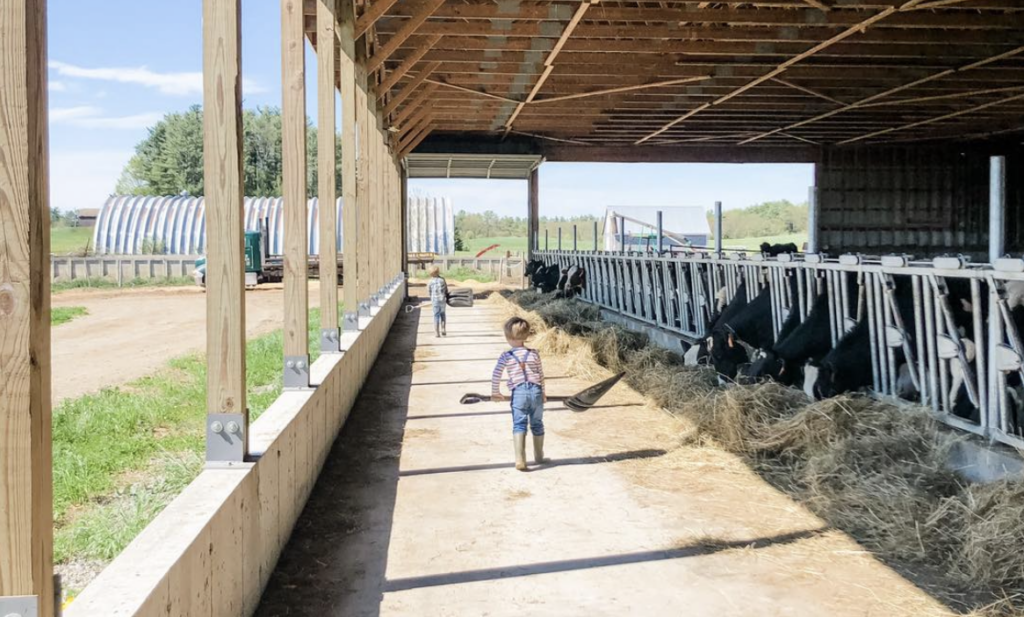By: AnnMarie Hilton – April 2, 2025 5:19 am

Dairy farms like Sheepscot Valley don’t have control over the prices their products are sold at, so to deal with increased costs as a result of tariffs they could go deeper into debt or cut corners. (Photo courtesy of Annie Watson of Sheepscot Valley Farm)
Annie Watson, who along with her husband runs Sheepscot Valley Farm, expects the cost of organic grain imported from Canada to increase by as much as $100 per ton under new tariffs. That would mean an additional $1,200 to $1,400 a month to feed the 70 cows they milk at the Whitefield dairy operation.
“Regardless of the size of our herds or whether we are first generation farmers or 10th generation dairy farmers, dairy farmers are facing the rising costs from tariffs,” she said.
As president of the Maine Dairy Industry Association, Watson joined other leaders from Maine’s farming and craft beer industries who spoke Tuesday about their looming concerns for the next round of tariffs. While they worry increased costs could be passed onto consumers, the tariffs also come after many farms have already planned for the season ahead meaning higher prices could eat away at their already thin profit margins.
The agriculture sector, like many Maine industries concerned by a potential trade war, is deeply interconnected with the state’s northern neighbor. Every year, Maine exports $1.4 billion in goods to Canada and in turn imports more than $5 billion worth of goods.
President Donald Trump’s latest round of taxes on imports, set to take effect Wednesday, includes “reciprocal tariffs” on countries that have their own tariffs set on U.S. products. Since taking office in January, he has imposed new tariffs on China, as well as on certain goods from Canada and Mexico that could be expanded. He’s also added a tariff on imported cars and trucks set to take effect Thursday and raised the tax on foreign steel and aluminum.
The “on again, off again” tariff discussion that has colored the first few months of the Trump administration have left farmers in a state of limbo, waiting to see what will actually be imposed, how it will affect them and what decisions they will need to make in response, said Sarah Alexander, executive director of Maine Organic Farmers and Gardeners Association.
Alexander knows of one farm that planned to build another greenhouse this year, but has put that project on hold because the construction cost has already gone up by 50% due to the tariffs on steel and aluminum.
In addition to the cost of feed grain and fertilizer that Watson predicts will be affected, farmers could see prices increase for fuel and other resources they need to keep their operations running, Alexander said. Maine’s craft breweries have significant concerns about the tariff on aluminum, given how much of their product is sold in cans, said Sarah Bryan, executive director of the Maine Brewers Guild.
Alexander also said the tariffs could impact processing costs for the wild blueberry industry that is so integrated between Maine and Canada.
With these concerns echoed by farmers across the country, U.S. Secretary of Agriculture Brooke Rollins said Monday that the U.S. Department of Agriculture plans to aid farmers from potential economic fallout using similar strategies as in 2018, when a U.S.-China trade war during Trump’s first term led to an estimated $27 billion in U.S. agricultural export losses.
While Trump argues tariffs will encourage more domestic buying, Watson said degraded rail infrastructure makes it near impossible to transport all the grain that would be needed for farms in Maine from the Midwest or other parts of the country, especially with Canada so close.
Dairy farmers like Watson don’t have control over the prices their products are sold at, so she said they could go deeper into debt or cut corners, like feeding cows less grain, which could lead to fertility and production issues for the animals.
“I think our farmers are going to navigate how long can they hold off on passing through any of these increased prices to consumers, if possible,” Alexander said. But “ultimately that means it’s going to come out of the profitability of the farm.”
Story: here